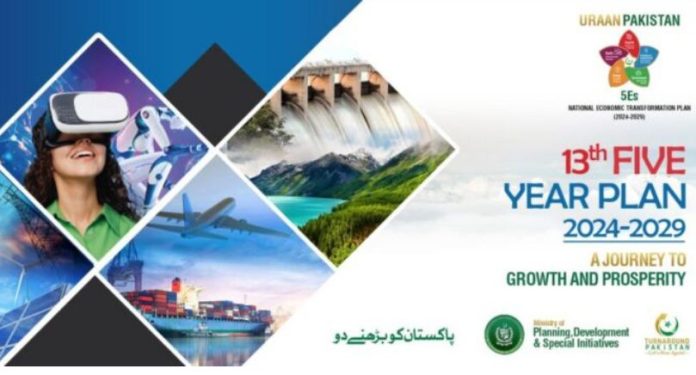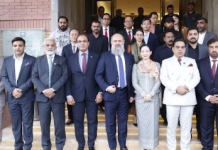PESHAWAR, Jan 12 (APP):Recognized as a beacon of shared prosperity, Uraan Pakistan is widely acclaimed for its wide-ranging goals aimed at reshaping lives of people through coordinated actions.The Pakistan’s 13th Five-Year Plan (2024-2029), dubbed as “Uraan Pakistan,” aims to chart a new path for the country’s sustainable economic growth and societal development.
Positioned at a pivotal moment in its history after its launch by Prime Minister Muhammad Shehbaz, Uran Pakistan provides an inclusive workable roadmap to address the socioeconomic and environmental challenges besides provides quality education and healthcare services I addition to create jobs opportunities for youth.
As Pakistan is determined to learn from the successes and failures of the previous plans, the 13th plan will help overcoming the long-standing systemic barriers that have hindered irs progress.
In an interview with APP, Professor Dr. Naeem Khattak, former Chairman of the Economics Department at the University of Peshawar, described Uraan Pakistan as a pivotal initiative designed to strengthen the economy, alleviate poverty and create job opportunities for the youth.
Emphasizing the importance of reducing foreign debt dependence and fostering domestic industrial growth for long-term economic stability, he highlighted the critical need for innovation and technology, combining climate change imperative to drive a robust and export-oriented economy.
Dr. Khattak also called for transparent financial resource allocation and effective oversight to ensure the success of the 13th plan.
He stressed that the private sector’s participation, alongside accelerated infrastructure development and technological innovation, would play a crucial role in achieving the desired outcomes.
Investment in renewable energy, digital infrastructure, and vocational training to youth for a dignified employment are also central to the plan’s objectives.
Reflecting on past strategies, Dr. Khattak cited Dr. Mehboob-ul-Haq’s first Five-Year Plan (1983-1988), which focused on human resource development over mere economic expansion.
While political instability and governance issues in the past impeded the full realization of Dr. Haq’s vision, he noted that the subsequent plans attempted to address these challenges by focusing on economic growth, infrastructure, and social welfare.
However, despite incremental successes, the 11th and 12th Five-Year Plans faced major hurdles due to political turbulence, economic volatility, and gaps in policy implementation. The 12th Plan, for instance, aimed for a 7-8% annual GDP growth but was significantly impacted by external shocks, including the global COVID-19 pandemic.
Despite these challenges, the 13th Five-Year Plan—Uraan Pakistan—offers a renewed vision. This plan prioritizes innovation, environmental sustainability, and social infrastructure.
He said a key component of the plan is the creation of a knowledge-based economy, with an emphasis on sectors like information technology, renewable energy, and agriculture.
“The aim is to position Pakistan as a competitive player in the global economy, ensuring that developmental benefits reach all segments of society, particularly marginalized groups such as women and rural communities.”
PMLN Nowshera President Hamza Khan also lauded the economic stability under the PMLN government, pointing to the country’s solid efforts to combate unemployment, price hike besides a better positive stock market performance.
He reported that Pakistan’s foreign receipts had increased significantly, with expectations for further growth by the end of the financial year.
The plan also sets ambitious targets for 2035, aiming for a national GDP of one trillion dollars and an annual growth rate of 6% over the next five years.
As part of its climate commitment, Uraan Pakistan proposes green technologies, water conservation measures, and sustainable agricultural practices to combat climate change.
Gulzar Rehman, former Conservator of Forests said Pakistan was highly vulnerable to climate change, emphasizing that Uraan Pakistan offers comprehensive solutions to environmental challenges.
He pointed out that the past plans underscored the importance of political stability and economic policy continuity, urging a unified approach across all levels of government and society to achieve the plan’s objectives.
Experts agreed that Uraan Pakistan represents a beacon of hope for the nation, offering a roadmap for sustainable and inclusive growth.
With unwavering political will, effective governance, and collaboration across sectors, Pakistan can realize the aspirations of its people and secure a prosperous future for generations to come.

















